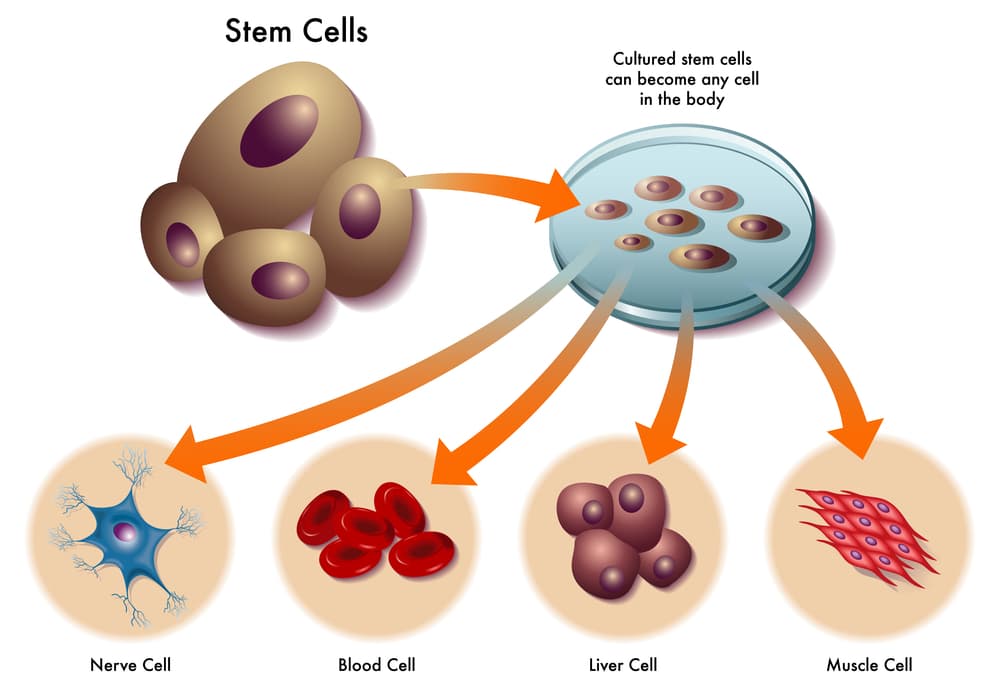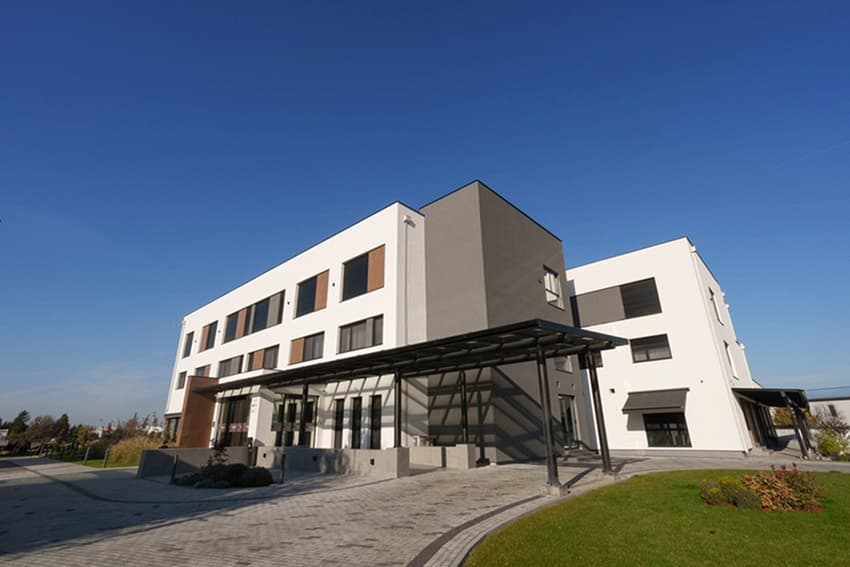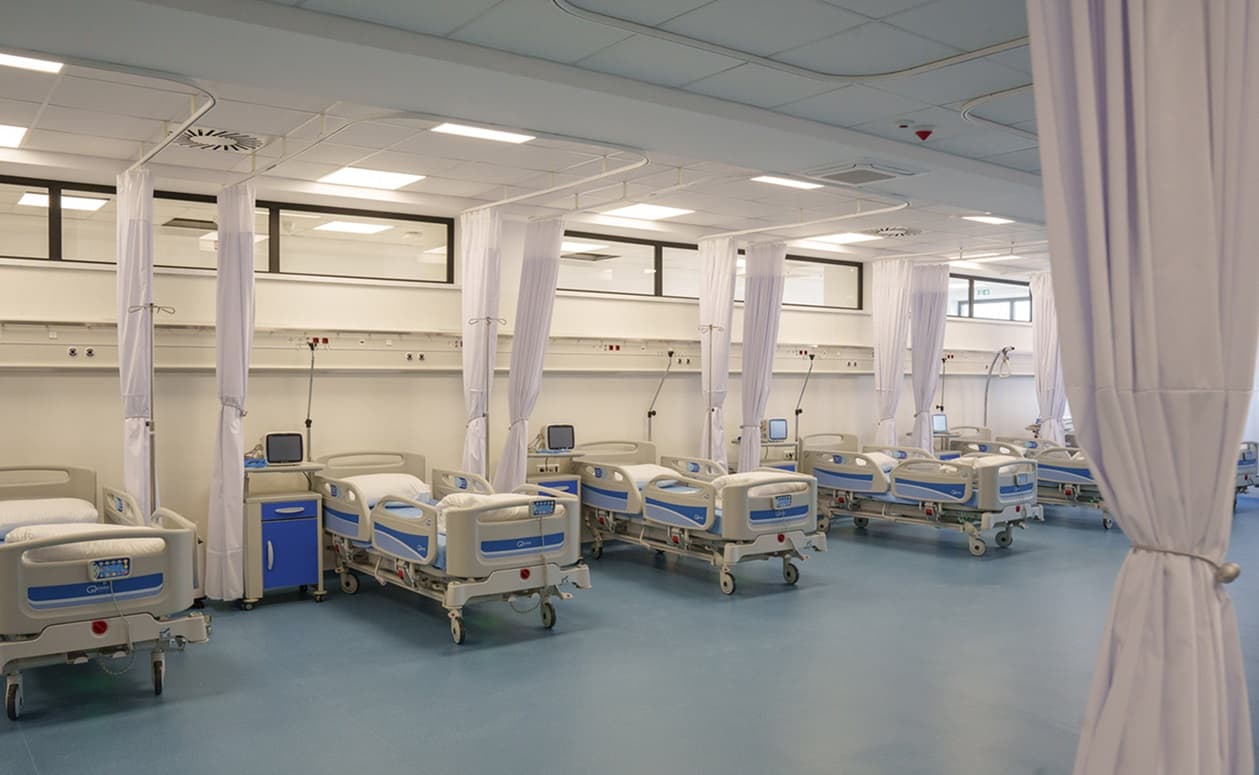Adult stem cells, also known as somatic stem cells, are undifferentiated cells found in various tissues throughout the body. They play a crucial role in regenerative medicine through the support of tissue homeostasis and injury repair.
Adult stem cells are multipotent, meaning they can differentiate into cell types specific to their tissue of origin. They have great potential for treating diseases and injuries, without the ethical issues linked to embryonic stem cells. In this article, we will share answers the following questions:
- what are adult stem cells?
- what are their benefits?
- how to choose a reputable stem cell clinic?
- what are the treatment costs?
What Are Adult Stem Cells?
They are called “adult” because they are found in various tissues throughout the body, in contrast to embryonic stem cells, which are obtained from embryos. Adult stem cells gain wide attention due to their benefits and are currently being used in various medical treatments.
Adult stem cells definition and characteristics
Adult stem cells are undifferentiated cells found in various adult tissues. They possess two key properties:
- Self-renewal: The ability to undergo numerous cycles of cell division while maintaining their undifferentiated state.
- Multipotency: The capacity to differentiate into multiple cell types specific to the tissue or organ from which they originate.
The role of adult stem cells in the human body
Adult stem cells play a vital role in maintaining tissue homeostasis and supporting the repair of damaged tissues. Their primary functions include:
- Adult stem cells are beneficial for tissue repair. They create the right conditions for healing by releasing growth factors and cytokines—signaling molecules that stimulate cell growth, tissue repair, and the formation of new blood vessels (angiogenesis).
- Adult stem cells, particularly mesenchymal stem cells (MSCs), contribute to immune system regulation by modulating immune responses. Among the advantages of adult stem cells are effects leading to excessive immune responses and chronic inflammation decrease, and immune balance support.
Types of Adult Stem Cells and Their Functions
What can adult stem cells turn into? Adult stem cells are multipotent, meaning they can differentiate into multiple cell types, but generally only within the tissue or organ from which they originate. Here are examples of what different types of adult stem cells can turn into.
Mesenchymal stem cells (MSCs)
Mesenchymal stem cells can be isolated from bone marrow, adipose tissue, umbilical cord tissue and other organs. Due to their tissue repair support and immune system modulation effects, MSCs are widely employed in regenerative medicine. At Swiss Medica, one of the most well-known stem cell clinics, we exclusively use mesenchymal stem cells because they are safer and well-tolerated by the body.
Neural stem cells (NSCs)
Neural stem cells NSCs are present in specific areas of the brain. They produce brain cell types, mainly neurons, astrocytes, and oligodendrocytes, responsible for brain functionality and repair. They help treat neurological disorders and injuries. At Swiss Medica, we also use NSCs deriving them in the laboratory from bone marrow MSCs.
Hematopoietic stem cells (HSCs)
Hematopoietic stem cells are located in the bone marrow and umbilical cord blood. Being responsible for production of all types of blood cells—red blood cells, white blood cells, and platelets, HSCs are also majorly used in bone marrow transplants in the treatment of blood-related disorders and cancers. The most common side effects are linked to hematopoietic stem cells. Swiss Medica does not perform hematopoietic stem cell transplants.
Epithelial stem cells
Epithelial stem cells are present in the lining of the digestive tract and skin. Though less commonly used than other stem cell types, these cells are being studied for their potential to regenerate damaged epithelial layers in organs such as the gut and lungs.
Other types of adult stem cells
- Skeletal muscle stem cells (Satellite Cells) that may promote skeletal muscle repair and regeneration following injury.
- Adipose-derived stem cells ADSCs found in fat tissue may be beneficial for medical and aesthetic applications because of their regenerative, immunomodulatory, anti-aging, and anti-inflammatory properties.
- Intestinal stem cells may support overall digestive function, maintain gut health, and repair damage. Located in the intestinal crypts, these cells provide a continuous renewal of the intestinal lining, crucial for food absorption and offering protection against harmful substances.
- Mammary stem cells give rise to formation and maintenance of the mammary gland, especially during puberty and when one is pregnant.

How Are Adult Stem Cells Used in Medicine?
Adult stem cells have shown significant promise for the treatment of many diseases that were, until now, hard to manage. Some of the major diseases being treated with adult stem cells include neurological conditions, brain injuries, stroke recovery, autoimmune diseases, and other inflammatory disorders.
Neurological conditions and brain repair
Adult stem cells protect against neurodegeneration and support neural repair while reducing inflammation. Stem cell therapy for Alzheimer’s and Parkinson’s diseases helps slow disease progression and provide symptomatic relief in these and other neurological conditions. Neural stem cells can help with brain injuries by regenerating neural tissue. They can develop into neurons or glial cells, supporting neurological function and aiding recovery.
Stroke recovery
Mesenchymal stem cells may promote recovery after stroke by lowering inflammation and enhancing tissue repair in brain injuries. Therapy with stem cells for stroke is a safe procedure that helps activate surrounding cells in affected brain areas, promoting recovery and improving brain function. Adult stem cell therapy may improve joint flexibility, enhance finger agility, and boost limb control.
Autoimmune diseases and inflammatory disorders
The use of stem cells in treating autoimmune and inflammatory conditions, such as rheumatoid arthritis and multiple sclerosis, offers immunomodulation benefits. These benefits of adult stem cells may lead to long-term remission and reduced disease activity.
Potential in heart disease
Research into adult stem cells for conditions like heart attacks and arterial hypertension has shown promising results. These stem cells can stimulate the growth of new blood vessels, improve neuromuscular conduction, and provide anti-inflammatory and immunomodulatory effects. Heart attack stem cell therapy contributes to better heart function.
Use in orthopedic and sports medicine
Stem cell therapy for sports injuries use adult stem cells, such as mesenchymal stem cells to support tissue repair. These stem cells trigger growth factors that help decrease inflammation, thus leading to less pain and swelling in the injured area. Adult stem cell therapy not only relieves symptoms and enhances mobility but also supports long-term recovery.
Treatment of blood disorders
Adult stem cells, in particular hematopoietic stem cells, have long been used for the treatment of blood-related disorders. These cells can produce all types of blood cells, making them essential for bone marrow transplants in conditions like leukemia. Established as the standard for the treatment of many blood cancers, hematopoietic stem cell transplants continue to improve outcomes for patients with severe blood disorders.
Get a free online consultation
Interested in how adult stem cells could support your health? Get a free consultation with our specialists to explore personalized treatment options tailored to your needs.

Medical Advisor, Swiss Medica doctor
Choosing the Right Clinic for Adult Stem Cell Therapy
Here are the steps that may help evaluate clinics:
- Compare different clinics based on their credentials, treatment options, and patient feedback.
- Engage with stem cell experts to understand the most effective treatments for your condition.
- Prepare a list of questions to ask during consultations, including those about treatment protocols, advantages of using adult stem cells for your condition, safety measures, potential outcomes, and costs.
At Swiss Medica, we provide advanced adult stem cell therapies in a patient-centered environment, ensuring individualized care and regenerative solutions that prioritize your needs. Here’s what you can expect:
- You can discuss your condition, ask any questions, and learn about your treatment options before starting therapy during a free consultation.
- Every plan is uniquely tailored to each patient’s needs and treatment goals.
- We offer different types of adult stem cells and administration methods to ensure the best results for each patient.
- We adhere to rigorous safety protocols, guaranteeing the purity, safety, and efficacy of our stem cells.
- Our doctors are extensively trained in regenerative medicine and have years of experience in stem cell therapy.
- We assist with accommodation, airport transfers, and continuous medical consultations for a seamless experience.
- Our medical facilities in Serbia are accessible via direct flights from many major cities around the world.
- We ensure precise stem cell preparation and dosing for maximum therapeutic benefit at our advanced in-house lab.
- Our team is committed to monitoring your progress for optimal recovery.
- Many patients report significant pain relief, enhanced mobility, and overall improvement in their quality of life.
Our new hospital in Belgrade offers a state-of-the-art, patient-focused setting for advanced treatment using adult stem cell therapy.
How Are Adult Stem Cells Collected?
At Swiss Medica, we employ the following methods:
- Donor cells may be collected from placental tissue (the tissue that supports fetal growth) and umbilical cord tissue. We always ensure that donors voluntarily donate cells following a normal, healthy birth.
- Adult multipotent mesenchymal stem cells collected from the patient’s tissues. This could be body fat, bone marrow, gingiva, and some other sources.
Autologous MSCs are harvested using minimally invasive procedures, under local or general anesthesia. Before any stem cell product is given to a patient, it undergoes multiple thorough inspections to ensure its safety.
How Much Does Adult Stem Cell Therapy Cost?
The cost of adult stem cell therapies can vary significantly depending on the location and the specific condition being treated. It’s important to consider regional factors when evaluating the cost of treatment, as inconsistencies in pricing can be influenced by these variables.
Here are some general cost indicators for stem cell therapies:
General range: Stem cell therapy can range from $5,000 to $50,000 or more, depending on the nature of the treatment.
- Joint injections for orthopedic conditions typically cost less than $5,000.
- Knee osteoarthritis treatment can range from $5,000 to $8,000.
- Complex therapies for autoimmune or degenerative conditions can cost $27,500 or higher.
In countries like the U.S. and Western Europe, prices tend to be at the higher end of the spectrum, averaging between $20,000 and $50,000. However, in countries such as Serbia or Turkey, stem cell treatments are more affordable without compromising quality.
At Swiss Medica, treatment costs generally range from €7,000 to €31,000* depending on the specific condition being treated and the number of sessions required. Transparent pricing is available upon request, and personalized treatment plans are provided after an initial consultation.
*The prices mentioned are indicative and subject to change based on individual factors, including the condition’s severity and the number of stem cells needed. Prices are valid as of January 2025.
Advantages and Challenges of Using Adult Stem Cells
Advantages of adult stem cells make them much more preferable to their embryonic counterparts.
Benefits over embryonic stem cells
The advantages of adult stem cells make them a preferable choice over embryonic stem cells.
- Adult stem cells are sourced from adult tissues, avoiding the destruction of embryos and the ethical concerns tied to the use of embryonic stem cells.
- At Swiss Medica, we use mesenchymal stem cells (MSCs) with low HLA expression, reducing the risk of immune rejection and eliminating the need for donor matching.
- Adult stem cells are simpler to collect and pose fewer ethical challenges compared to embryonic stem cells, which are harder to obtain and often controversial.
Swiss Medica ensures the highest standards of care by:
- Safety protocols: We collect stem cells in sterile environments to prevent contamination and ensure safety.
- On-site lab: Our in-house lab ensures rigorous quality control and precise coordination throughout the treatment process.
- Expert staff: Our team is extensively trained in stem cell therapy to deliver safe and effective treatments.
Ethical and Safety Considerations
The development and application of stem cell research should always prioritize ethical and safety standards to ensure responsible use of adult stem cells. Organizations like the International Society for Stem Cell Research provide guidelines to maintain the safety and efficacy of stem cell treatments, minimizing risks associated with their use.
According to adult stem cells definition, they are harvested from adult tissues and do not involve the destruction of embryos. This means that adult stem cells present fewer ethical concerns than embryonic stem cells. Also, adult stem cell treatments result in minor, short-lived side effects, such as swelling or pain at the injection site, fatigue, and fever. These side effects are generally temporary and subside quickly.
Limitations and areas for further research
Ongoing research into adult stem cells focuses on overcoming challenges related to scalability and accessibility, making these cells more suitable for broader therapeutic applications. A key goal is to develop standardized protocols for the isolation, culture, and application of adult stem cells to ensure consistency and effectiveness in treatments.
Further areas of exploration include:
- Combining adult stem cells with other treatments, such as gene editing technologies and immunotherapies, to enhance their therapeutic potential.
- New techniques are also being developed to activate and target adult stem cells naturally within the body, promoting tissue repair directly at the site of injury (In Vivo Tissue Repair).
- Additionally, adult stem cells hold promise for treating diseases affecting the nervous system, like Parkinson’s disease, as well as heart conditions such as heart failure. These advancements could significantly improve treatment options for patients suffering from these conditions, offering new hope for better outcomes.
Frequently Asked Questions About Adult Stem Cell Therapy
1. Are adult stem cell therapies proven to be safe and effective?
Adult stem cell therapies, particularly those using MSCs, have proven to be both safe and effective in treating a wide variety of conditions. The increasing body of clinical evidence, along with advancements in stem cell research and treatment protocols, reinforces their continued use in regenerative medicine. At Swiss Medica, we adhere to strict quality control measures and provide individualized care to ensure the highest standards of safety and effectiveness for our patients.
2. How long does it take to see results?
Results following adult stem cell treatment can vary, but some patients report improvements within a few days. Typically, patients are back to full physical activity in four to six weeks.
Contact us
Still have questions? We’ve got you covered! Book a free chat with our experts to learn more about how stem cell therapy might benefit you.

Medical Advisor, Swiss Medica doctor
List of References
Gurusamy N, Alsayari A, Rajasingh S, Rajasingh J. Adult Stem Cells for Regenerative Therapy. Prog Mol Biol Transl Sci. 2018;160:1-22. doi: 10.1016/bs.pmbts.2018.07.009. Epub 2018 Sep 6. PMID: 30470288.
Gugliandolo A, Bramanti P, Mazzon E. Mesenchymal Stem Cells in Multiple Sclerosis: Recent Evidence from Pre-Clinical to Clinical Studies. Int J Mol Sci. 2020 Nov 17;21(22):8662. doi: 10.3390/ijms21228662. PMID: 33212873; PMCID: PMC7698327.
Guo, Y., Yu, Y., Hu, S. et al. The therapeutic potential of mesenchymal stem cells for cardiovascular diseases. Cell Death Dis 11, 349 (2020). https://doi.org/10.1038/s41419-020-2542-9
Smith, J., & Doe, A. (2015). Advances in regenerative medicine. Journal of Stem Cell Research, 30(4), 123–134. https://doi.org/10.1016/S1063-4584(15)01234-0
McGuine T. Sports injuries in high school athletes: a review of injury-risk and injury-prevention research. Clin J Sport Med. 2006 Nov;16(6):488-99. doi: 10.1097/01.jsm.0000248848.62368.43. PMID: 17119362.
Vasanthan J, Gurusamy N, Rajasingh S, Sigamani V, Kirankumar S, Thomas EL, Rajasingh J. Role of Human Mesenchymal Stem Cells in Regenerative Therapy. Cells. 2020 Dec 31;10(1):54. doi: 10.3390/cells10010054. PMID: 33396426; PMCID: PMC7823630.
Matsuzaka, Yasunari, and Ryu Yashiro. 2024. “Current Strategies and Therapeutic Applications of Mesenchymal Stem Cell-Based Drug Delivery” Pharmaceuticals 17, no. 6: 707. https://doi.org/10.3390/ph17060707
Medical Advisor, Swiss Medica doctor











